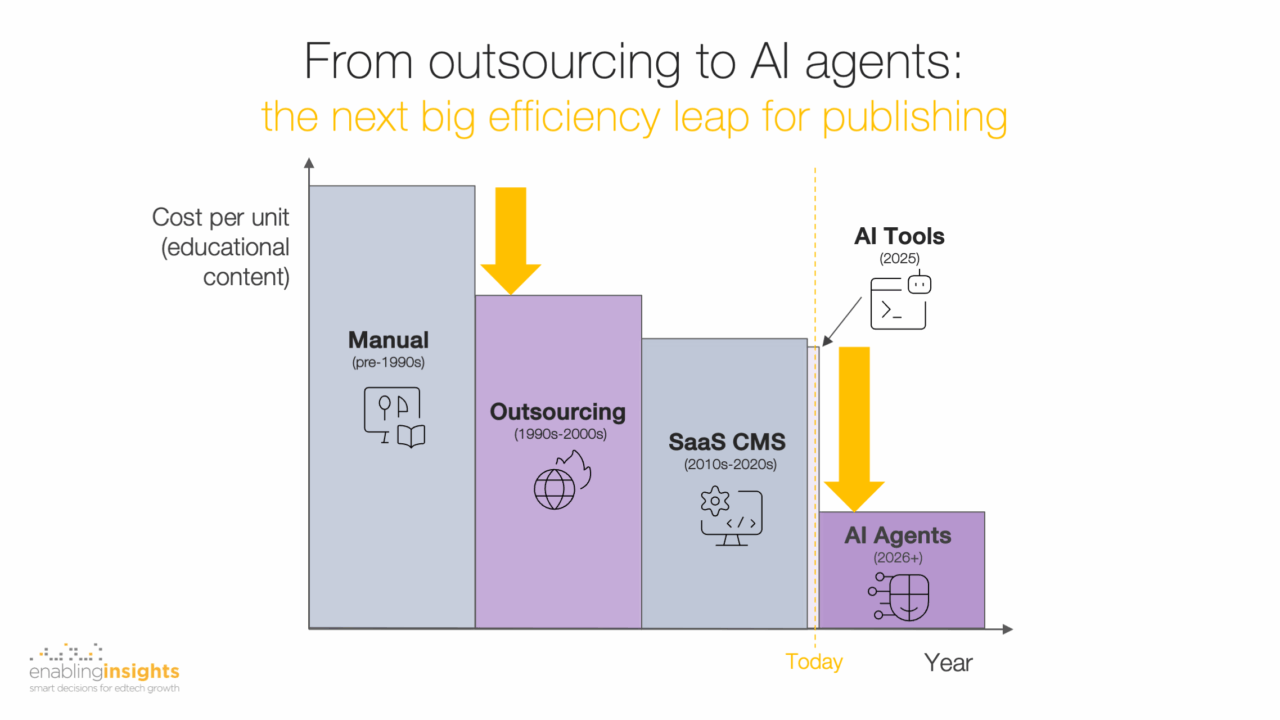How AI agents can transform the profitability of educational publishing

The leadership challenge today
If you lead an educational publisher, you face a growing challenge: improve the profitability of your portfolio today while preparing your capabilities and talent for once-in-a-generation changes in education that will reshape your portfolio tomorrow.
The need for a step-change in efficiency
To improve efficiencies, you’ve likely tested AI features in your content workflows—auto-drafts, summaries, tagging—but found the gains incremental. Useful experiments, but not transformative. (See my blog on why AI features only deliver incremental gains.)
To realize a step-change in efficiency, it’s worth reflecting on a few hard facts about educational publishing. From decades of working for and advising leading publishers, I’ve seen:
- Educational publishing is labor- and information-intensive. Armies of SMEs, editors, assessors, designers, and project managers shepherd tens of thousands of content items through complex workflows.
- Portfolios are only getting more complex. Print, eBooks, courseware, and growing volumes of customizations for markets and institutions all add cost.
- Workflows remain parallel and manual. Behind the showcase of digital transformation, workflows for books and courseware remain separate, with countless handovers and few efficiencies.
- Outsourcing was the last true step-change in profitability. It reset cost structures, but the benefit has long since flatlined.
The double urgency for educational publishers
That’s why improving content workflow efficiency in educational publishing isn’t optional. It’s the only way to shore up margins today so you can build the capacity to respond when market changes accelerate.
Without efficiency gains, publishers will struggle to fund the skills, technologies, and innovations needed for the next chapter of education.
In other words: efficiency improvements today are the foundations for your readiness for tomorrow.
Lessons from other industries on deploying agents
Other labor- and information-intensive industries have already shown what’s possible. In finance, insurance, and pharma, AI agents are delivering step-change gains in efficiency by taking on complex workflows once managed only by skilled professionals—and in highly regulated environments. For example, see how AI in transforming drug development, or McKinsey’s projections of productivity gains using AI.
These industries are characterized by:
- Highly documented, well-defined processes.
- Lots of labor-intensive, auditable tasks.
- Requirements for quality and compliance at every step.
These conditions makes them ideal for leveraging agents—and the results are striking: 10–100x improvements in cost, speed, and accuracy.
Why educational publishing is ready for agentic transformation
AI agents in educational publishing can deliver the same benefits. Despite being labor-intensive, publishing workflows are clearly codified and supported by extensive documentation—from style guides to learning objectives to human-polished content examples.
From working with Faculty AI to deploy agents in other sectors, it’s clear to me that agents can take on many of the most labor-intensive, time-consuming, and repetitive tasks of today’s educational publishers. From a more comprehensive assessment I recently undertook, here are a few examples:
- Style & Consistency Agents enforcing editorial rules across thousands of items.
- Assessment QA Agents validating alignment, accuracy, and functional performance.
- Translation & Localization Agents adapting content efficiently for new markets and institutions.
- Project Management Agents shadowing workflows, flagging bottlenecks, and supporting managers in real time.
These are not speculative ideas. They’re practical opportunities for how AI agents can be deployed in educational publishing today, using proven methods for configuring, deploying, and maturing AI agents in other industries.
In deploying AI agents, publishers can free up their existing talent to focus on higher value tasks, competitive differentiation, and readiness for the next generation of products. (See HolonIQ’s Global Education Outlook or my take on which AI edtech will win in higher education, when, and why.)
The next profitability breakthrough will be agents
When was your last significant profitability breakthrough? If the answer is outsourcing or layoffs, you need to be bolder.
AI agents are the next—and bigger—outsourcing. They offer a path to restoring profitability and building readiness for educational publishers to thrive in the disruption ahead.
A challenge and an invitation
So my challenge to you: have you taken a hard look at your content operations and started exploring how AI agents could transform them?
This is where I can help. I combine decades of experience in publishing with lessons from industries already scaling agents successfully. Together, we can identify where agents deliver the greatest ROI, and build the foundations for your next chapter of growth.
